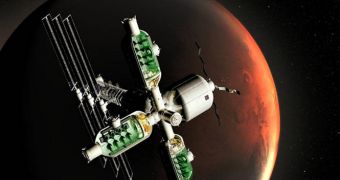Researchers believe that engineering microbes, bacteria and other microorganisms that can produce food and fuel is the way to go if we want to colonize Mars.
They explain that, otherwise, the costs associated with carrying vast amounts of food and propellant to the Red Planet would make colonizing missions impossible
In fact, it's best to carry as few things as possible from Earth, and produce all that is needed on location, using chemicals that are available anywhere in the solar system.
Microorganisms could also be used to produce oxygen, for example. Conceivably, sufficiently-large plantations or gardens would in time change the Martian atmosphere to a more breathable kind.
However, in short-term, such oxygen-producing bacteria could provide oxygen for small human bases. Our very existence on Earth was made possible by the fact that cyanobacteria can make photosynthesis.
“Personally I'm interested in space settlement,” explains Ames Research Center (ARC) graduate student, John Cumbers. The NASA facility is based on Moffett Field, California.
“I think we have two choices: We can either go into space and be living inside a tin can, or we can be going into space and recreating in space some of the beauty of nature we have here on Earth,” adds the expert, who is working on synthetic microbes.
“I think there's a lot that we can do that's productive with biology without having to release organisms in an unplanned fashion,” Cumbers explains for Astrobiology Magazine, quoted by Space.
The largest risk associated with this idea is the creation of microorganisms that would develop an agenda of their own. This forms of “Frankenlife” could become invasive, and kill regular organisms.
This would naturally defeat the purpose for which they were created, so researchers must exercise extreme caution in engineering them.
“I don't think this would be particularly hazardous. The sort of organisms that would be good at doing mineral extraction […] are not the type of organisms that cause disease,” says expert Chris McKay.
He holds an appointment as a planetary scientist at Ames, but was not a part of the new investigation.
“For manned missions to the moon or Mars we're going to have to take nearly everything with us, at least at the beginning,” Cumbers goes on to say.
“If we have this new technology where we can take the complete genome of an organism and send it into space – and can have that single cell replicate from the resources it finds around it rather than resources we've taken with us – then we've started to tackle the problem,” he concludes.

 14 DAY TRIAL //
14 DAY TRIAL //